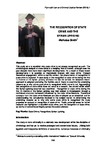The Recognition of State Crime and the Syrian Uprising
| dc.contributor.author | Smith, Nicholas | |
| dc.date.accessioned | 2017-03-28T14:55:46Z | |
| dc.date.accessioned | 2017-04-11T11:26:56Z | |
| dc.date.available | 2017-03-28T14:55:46Z | |
| dc.date.available | 2017-04-11T11:26:56Z | |
| dc.date.issued | 2013 | |
| dc.identifier.citation |
Smith, N. (2013) 'The Recognition of State Crime and the Syrian Uprising', Plymouth Law and Criminal Justice Review, 5, pp. 248-271. Available at: https://pearl.plymouth.ac.uk/handle/10026.1/8984 | en_US |
| dc.identifier.issn | 2054-149X | |
| dc.identifier.uri | http://hdl.handle.net/10026.1/8984 | |
| dc.description.abstract |
This study aims to establish why state crime is not always recognised as such. The criminological analysis of state crime is a fledgling field of interest, although over the past decade there have been significant developments. As a result of these recent developments it is possible to theoretically interact with state crime. Through theoretical engagement, within a real life context, the phenomenon of recognition of state crime is explored. A case study of the recognition of state crime during the first 15 months of the Syrian uprising provides the real life context. An ‘adaptive theory’ approach is adopted promoting the flexible use of theory to examine the underlying reasons as to why some state crime is recognised whilst some is not. Appreciating that recognition of state crime does not occur in a vacuum, the context within which the Syrian uprising occurred was examined. Recognition of state crime during the first 15 months of the Syrian uprising was then subject to investigation through a multi-level structural framework influenced by the state crime literature. Theoretical concepts from the state crime literature are also employed as an analytical tool for understanding the complexities involved in the subject matter. In determining the underlying reasons as to why only some state crime is recognised the study proposes an account of recognition of state crime. Finally, potential areas for further research are highlighted to establish state crime, and the recognition of state crime, as worthy of concentrated inquiry across the social sciences. | en_US |
| dc.language.iso | en | en_US |
| dc.publisher | University of Plymouth | |
| dc.rights | Attribution 4.0 International (CC BY 4.0) | * |
| dc.rights.uri | https://creativecommons.org/licenses/by/4.0/ | * |
| dc.subject | State Crime | en_US |
| dc.subject | Recognition | en_US |
| dc.subject | Syrian Uprising | en_US |
| dc.title | The Recognition of State Crime and the Syrian Uprising | en_US |
| dc.type | Article | en_US |
| dc.type | Article | |
| plymouth.volume | 5 | |
| plymouth.journal | The Plymouth Law & Criminal Justice Review |



